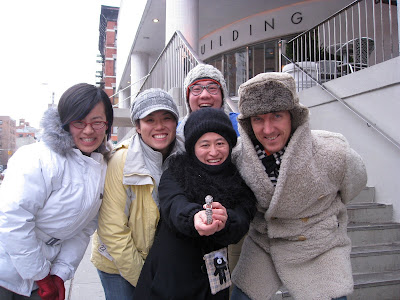John Hardy: Baubles with a conscience
Joy Ohara, Susan Lee, me (with Damien's bracelet), and pals form university days Lye Kok (back) and Damien Dernoncourt outside the Maritime Hotel, Chelsea, Manhattan
On Saturday I had the pleasure of meeting Damien Dernoncourt, CEO and principal of John Hardy, makers of extremely fine silver jewelry in the Balinese tradition.
Apart from a mutual friendship with Bike Friday customers Lye and Joy, Damien had something in common: a handmade product with a story. In Damien's case, a stunning range of high-end silver jewelry made in Bali, where his company is the tiny country's biggest employer.
In my case, my little Traffic Cone Bag that's made in America (and of course, Bike Fridays, made in Eugene, Oregon).
 When you see Damien's jewelry displayed in chic 5th Ave store windows, seemingly untouchable unless you're dressed well enough to hit the buzzer and enter, you'd never imagine the human and inspiring story behind it.
When you see Damien's jewelry displayed in chic 5th Ave store windows, seemingly untouchable unless you're dressed well enough to hit the buzzer and enter, you'd never imagine the human and inspiring story behind it.First, the Balinese have their own hybrid style of Hinduism, where they believe they will go to a heaven just like Bali. However, history has shown they are still very much imperfectly human.
"There were several different rulers presiding over different parts of the country," explained Damien. "Rather than try and outdo each other by staging civil wars, leaders asserted power peacefully by outglitzing each other - building a bigger, better temple, alter, garden, jewelry and finery, raising the standard of craftsmanship to an outstanding level," he said, "particularly in silverwork."
I remember driving through Ubud, the arts and crafts epicenter in the mountains some 25 years ago, and marveling at front yard after front yard of identically and perfectly carved palm trees and birds.
But John Hardy Inc makes makes sure that work is properly rewarded.
"Women need to look after their family. If they have to come to work, then they have to pay for day care and they end up with no money. So we let the work from home."
It works like this: workers come to the factory in the morning and pick up their bag of silver and materials, which is weighed. They return to their houses to do their assigned task. In the case of the bracelet pictured above, the workers take the silver wire and make the links, then over several days creates the supple rope you see. They bring the result of their work back to the factory to collect their pay and the next lot of raw materials.
The bracelet features the cast head of an ocelot or some wildcat, with teeth that close around the loop forming a rather toothy clasp.
"We get the casting and inlay of stones done in Thailand, where they are really expert at that," he says.
So what does the piece sell for?
"$5000 with the stones, $1400 without."
And how are the workers paid?
"Where the government mandated monthly salary is say, $100, we make sure we pay them more, say $150. It's a good living wage."
Damien also spoke of how he once visited a factory in China for one of his previous manufacturing stints, and saw how the operations researcher told him how to pack 12 people to a single dorm room to make a certain bottom line.
"I didn't feel good about it," he said. "I decided to make it 6 people per dorm. What we have learned, is that when you give people more - more room, more money, more incentives, more respect, the marginal benefit they receive and in turn give back is far greater than the marginal cost."
During this time he was turning my Traffic Cone Bag inside out, outside in, scrutinizing it as he would the many products he has dealt with - from tools (really good in China) to jewels, and listening to it's "story".
"This has a story, you should sell it for more," he said. I guess he isn't familiar with the famously frugal bicycle community, where the only thing not expected to be cheap or free is Lance.
During this time he was turning my Traffic Cone Bag inside out, outside in, scrutinizing it as he would the many products he has dealt with - from tools (really good in China) to jewels, and listening to it's "story".
"This has a story, you should sell it for more," he said. I guess he isn't familiar with the famously frugal bicycle community, where the only thing not expected to be cheap or free is Lance.
So next time you wander down 5th Ave, see a perfectly halogen-lit bauble and assume that someone's life was harmed in the making of that trinket, check the label - it might just be one of Damien's pieces, as socially conscious as it is unique.
FastCompany.com: Why the Gal's TCB is made in NYC


Comments